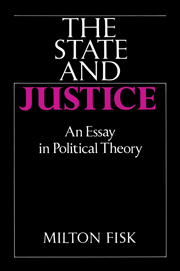Book contents
- Frontmatter
- Contents
- Preface
- Introduction: Can the state rule without justice?
- Part One An outline of a materialist political theory
- Part Two An assessment of the place of justice in the state
- Part Three A functional view of political institutions
- Part Four An account of the community of states
- 17 Global justice
- 18 The imperial state
- 19 Peace through strength
- 20 The Soviet Union as other
- Part Five A reflection on the transition to a new kind of state
- Conclusion: State, class, and democracy
- Notes
- Index
- Frontmatter
- Contents
- Preface
- Introduction: Can the state rule without justice?
- Part One An outline of a materialist political theory
- Part Two An assessment of the place of justice in the state
- Part Three A functional view of political institutions
- Part Four An account of the community of states
- 17 Global justice
- 18 The imperial state
- 19 Peace through strength
- 20 The Soviet Union as other
- Part Five A reflection on the transition to a new kind of state
- Conclusion: State, class, and democracy
- Notes
- Index
Summary
The 1941 declaration of President Roosevelt and Prime Minister Churchill known as the Atlantic Charter announced the beginning of a new world order. The mantle of imperial world leadership passed from Britain to the United States with the Charter's recognition that nations had the right to self-governance, as they did not under colonial rule, and that nations would participate on an equal basis in free trade, as they did not under a system of colonial preferences. Most importantly, the new imperial leader, with the help of the old imperial leader, would establish a global order characterized by “freedom from fear and want.” A promising beginning would soon be made against fear with the Allied war effort to defeat fascism and had already been made against want with booming war economies that had ended the Great Depression. Earlier in the year, Roosevelt had justified the Lend-Lease Bill in his Four Freedoms speech by appeal to freedom from fear and want, in conjunction with freedom of speech and worship.
A lot remained to be determined; isolationism was dead, but what would be the mechanism for insuring peace and prosperity in the postwar world? Would this conception of global justice be effective in advancing the interests of U.S. capital, or would it place obstacles in the way of those interests? How has the U.S. state been altered by embodying this conception of global justice?
- Type
- Chapter
- Information
- The State and JusticeAn Essay in Political Theory, pp. 233 - 245Publisher: Cambridge University PressPrint publication year: 1989

